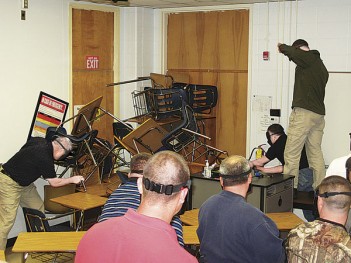
Participants in an A.L.I.C.E. training session wait by a barricaded door to react if a Vienna Police officer, playing the role of the gunman, is able to enter the classroom Wednesday at West Virginia University at Parkersburg.
PARKERSBURG, W.Va. — Local law enforcement officers, educators and others were quick studies of the A.L.I.C.E. program during training this week at West Virginia University at Parkersburg.
As they sat in a classroom Wednesday morning, waiting for a drill in which an officer would play the role of a gunman to begin, the nearly 30 participants were surprised when Parkersburg Police Detective D.D. Sturm rose from his seat and drew an Airsoft pistol from his waistband. Startled minutes earlier when a simulated gunman burst into the room before the drill was supposed to begin, they quickly sprang into action.
“I’ve never seen so many bodies go flying,” said Natalie Holcomb, executive assistant to the commissioner of the West Virginia Department of Motor Vehicles and instructor for a class at WVU-P’s Jackson County Center.
Participants hurled tennis balls – used to simulate common objects they might be holding – at Sturm, while others grabbed him and held his arms. The detective wasn’t able to fully squeeze the trigger of his weapon.
Lt. Joe Hendry, with the A.L.I.C.E. Training Institute in Medina, Ohio, declared the drill over in three seconds.
“I’ve never had that happen before, where he doesn’t get a round off,” Hendry said.
The drills were part of the second day of training for participants to be instructors for the A.L.I.C.E. program, which stands for Alert, Lockdown, Inform, Counter, Evacuate. It’s designed to increase the chances of survival in an encounter with an armed intruder by giving people more options than the traditional lockdown method employed by many schools over the years.
The Parkersburg Police Department and RESA 5, which provides support services to eight West Virginia school districts, played host to the training. RESA safety officers, Parkersburg and Vienna police; deputies from the Kanawha, Ritchie and Washington County sheriff’s department; and representatives from the Bureau of Public Debt, WVU-P and Warren Local Schools were among the participants.
“We wanted to get a bigger cadre of instructors in place,” Parkersburg Police Chief Joe Martin said.
The 31 students will be able to take the training back to their workplaces or, in the case of law enforcement, to schools and businesses in the area.
“A lot of things have changed with teaching strategies over the years,” said RESA 5 executive director Joe Oliverio. “We need to look at changing safety strategies.”
The most common policy for schools when it comes to dealing with an armed intruder has long been the lockdown, in which teachers and students take shelter in a classroom and lock the door. That’s also the method used in Wednesday’s first drill, in which 14 of the 31 participants were “shot,” Oliverio said.
“We’ve been lockdown for years,” said Al Collins, WVU-P campus police officer. After participating in the lockdown-only drill Wednesday morning, Collins described it as “sitting there waiting to be killed.”
In the next drill, participants were alerted to the presence of an armed intruder in the building and informed of his whereabouts. They locked the classroom door, used a belt to further secure it, then piled desks in front of it and spread out from the window in the door, readying tennis balls to hurl at the gunman if he got inside.
He never did, but in reality, an intruder could shoot the door open or otherwise force his way inside.
“The barricade slows the bad guy down and gives people in the room time to set up countermeasures and gives the police time to get there,” Hendry said.
Later, participants were divided between two classrooms. As the shooter’s location was announced by Hendry over a walkie-talkie, the students in the farthest room were able to make their way to a stairwell while the shooter tried to get into the other room.
Hendry attempted to throw students off with the surprise drills, both of which ended with the shooter being immobilized by participants.
Finally, a class change was simulated with participants walking in the hallway. Some ran for the stairs while others tackled the shooter – Sturm again – as soon as he emerged. He fired 10 rounds but struck just one individual, who was not among the group that engaged him.
“I was engulfed. I was lifted up and off (my feet),” Sturm said.
The counter portion of the A.L.I.C.E. acronym may give the most people pause. Hendry said it’s only to be used as a last resort, in a life-or-death situation.
“If you want to go home, then you may have to take some action to save yourself,” he said.
The A.L.I.C.E. strategy is not a linear progression but designed to give people the knowledge to make decisions based on the situation in which they find themselves.
Hendry said A.L.I.C.E. training in schools varies based on the ages of the participants. Younger children are taught to make noise and run away, while the concept of throwing items to distract and disrupt the shooter is taught around middle school. High schoolers, who are physically and mentally capable, are introduced to the counter aspect.
Martin said seven Parkersburg Police officers were trained as instructors and will be able to provide training, at no charge, to any entity in Wood County. Those interested can contact the department at 304-424-8444.
Marietta Police have been teaching the A.L.I.C.E. method at Marietta City Schools in recent years. Washington County Sheriff’s deputies have taught variations at other schools in the county and participated in the Parkersburg training to see if there were additional strategies they could incorporate, Sheriff Larry Mincks said.
To read more from the Parkersburg News and Sentinel, subscribe here.




